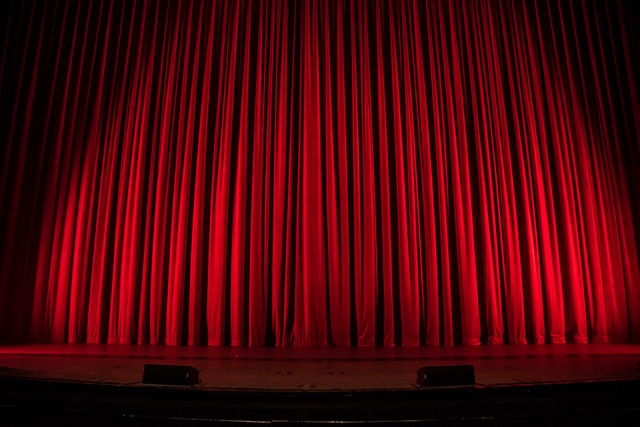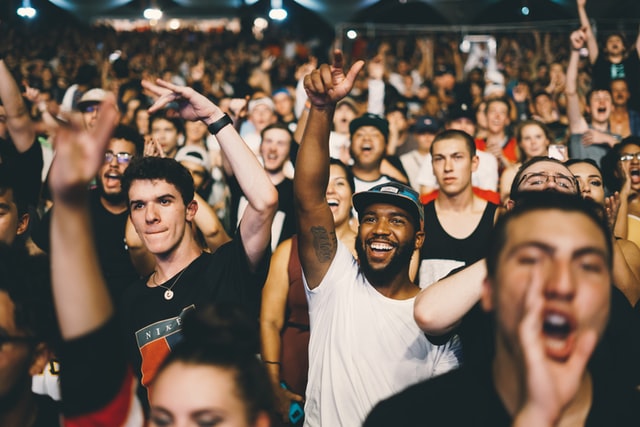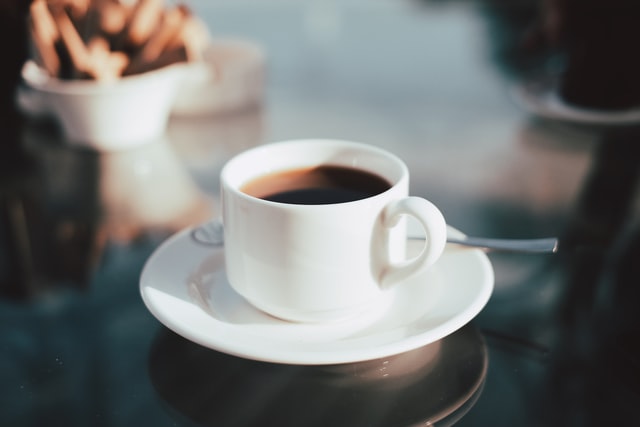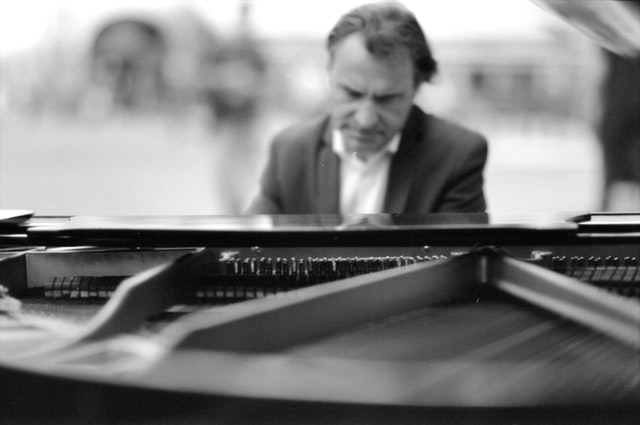How to get over stage fright as a pianist? This is something almost every piano player goes through at some stage, having to perform in front of people for the first time, or even for the 100th time! Either way can be just as intimidating and some people suffer from stage fright far worse than others.
In this guide, we’re looking at some of the top tips on how to get over stage fright. What methods can be used to overcome the fear that comes before performing, and where does this even come from.
Why Stage Fright is a Big Deal for Pianists
Stage fright, otherwise known as performance anxiety, is not just a problem for piano players to deal with. It’s not even exclusive to musicians. People from all sorts of walks of life can struggle greatly with stage fright. Have you ever had to give a presentation at school, college or work and not wanted to get up in front of people?
It’s natural to be scared of the spotlight, especially if you have a certain personality type. If you have learned piano online, it can be daunting to take your new skills and show them off in front of people.
It’s a big deal for pianists compared to some other instruments. While we don’t want to belittle the struggles other people have with stage fright, other musicians can often “hide” any mistakes a little bit more easily.
For one, piano is often a solo instrument, so people don’t have the sound of their bandmates to pick up the slack. If you are a guitarist and you make an error, it is likely to be less noticeable as you will probably have other guitarists and instrumentalists in your band who are disguising the errors.
Also, it is always presented as a “clean” sound. A bum note with heavy distortion is sometimes less noticeable than a bum note on the piano, which, let’s face it, is usually pretty obvious and hard to “style it out”.
What is Stage Fright?
It helps to understand what stage fright is before you start to try and combat it. Understanding can be the first step to know exactly what you should be tackling.
It’s human instinct to not want to make a fool of yourself. People don’t want to be outcasts socially, and it is natural to go through worst-case scenarios in your head before you perform or speak in public. This can mean nightmare situations being run through in your head. Some people are nervous when one other person is hearing them speak or perform, let alone hundreds of people.
Stage fright is just the part of your brain that doesn’t want you to be a social outcast. It is the part of your brain that limits you, and the internal monologue that tells you that you are going to make an error and feel humiliation, which nobody wants!
There’s an internal battle. Knowing how to get over stage fright is not easy, and might take some time, but generally speaking, it is a battle you can win by following our tips.
Why You Need to Overcome Stage Fright
This is no joke. Stage fright is not just “feeling a bit nervous”. Some of the people looking into how to get over stage fright are struggling from some of the issues that can accompany stage fright. The symptoms can be debilitating, and if you are going to be a performer, they aren’t the sort of thing you want to have to deal with every time you play in front of others.
- Increased pulse and breathing difficulties.
- Dry mouth (terrible if you are going to be singing as well).
- Trembling, including the hands, feet and within your voice, all things you might need to use when playing the piano.
- Sweaty hands (and therefore sticky keys).
- Vision issues, nausea and a general feeling of dread.
If you are getting any of these symptoms, the chances are that you are going to perform to the best of your abilities are almost zero. The very concept of stage fright can lead you to worse performance. It’s easy to get in a negative downward spiral in this way and to freak yourself out.
Getting over stage fright is not optional for many people. It’s essential.
How to Get Over Stage Fright – Top Tips
Our top tips for getting over stage fright can be found below. Some will work better than others for each individual, so be sure to experiment with them.
Some of the tips are simple mind games that you can play on yourself, others are calming exercises endorsed by science. Different personalities respond better to different methods.
Find a Friendly Face in the Crowd
This is a great tip for getting over stage fright if you are playing to a big crowd.
Ignoring the crowd altogether is not a good technique, your brain will still know that it is there, and you shouldn’t just try and fool yourself in this way. Instead, don’t focus on the scary faces such as strangers or examiners in the audience. Instead, scan for friendly faces in the crowd.
These friendly faces may come in the form of family and friends who are in the audience. People you know are going to support you no matter what happens in your performance.
It can also be a literal “friendly face”. Someone you look at in the crowd and that reminds you that, after all, these are just people. You don’t need to be scared and the people in the crowd will not be waiting for you to fail, or willing you to make errors.
Practice as Much as You Can
This is about preparation. If you haven’t prepared to the best of your ability then there is a much higher chance that you will make errors in your playing, and you will know this before you get started.
It is a bit like an exam. You only get one shot at it, so you had better be ready before you get to the big event. This doesn’t mean that you have to build it up in your head, but you do have to be prepared. You wouldn’t go into a science or history exam without preparing. Practice and revise.
The advantage of a performance or a recital is that you know what is going to be expected of you. No random curveballs or questions you didn’t revise for, you can simply and easily get ready by knowing the songs you are going to play inside out.
This might sound obvious to some people, but there are a lot of musicians who take the approach of “it’ll be alright on the night”. It often is. If you know the songs, you will often be absolutely fine and play them to a high standard, but if you have any gaps in that knowledge then the performance night is not the night for them to crop up.
The “Nothing to Lose” Approach
Ask any successful musician if they have ever bombed on-stage, and the answer will be “yes”. There are even some examples of musicians putting in poor performances. It is more common in rock and pop music than it is in classical music due to the fact that most of the classical musicians have more training, but it does happen.
The video shown below is not for the faint-hearted. Some of the “fails” might make you cringe, but the goal is not to make you more scared. Instead, we want to show you that things can go wrong at any time. Even experienced, professional musicians can make errors onstage. Accepting that can take the pressure off for some people.
We call this the “nothing to lose” approach. What’s the worst that can happen? Accept the worst-case scenarios and you will know that it really can’t end up being that bad. If you fail, what happens then? Lose your way in the performance? The worst you can do is have to say “sorry, I’m going to start that again”.
So, what have you got to lose?
Release the Tension in Your Body
The body and the brain are linked, whether you like it or not. If you are tense then this will be reflected in your body. Muscles will tighten and you will “carry” your performance anxiety. One of the key tips for how to get over stage fright is to control the physical aspect, which means that the mental burden can potentially be lifted.
Everything gets tense in our bodies. This means the jaw, shoulders, or even our legs and arms. We freeze up. Not to mention the knots in the stomach.
You can tie this to a breathing exercise, gradually considering each of the areas of potential tightness in your body, and, one at a time, loosening them.
Loosen your feet with an inhale motion, relax with your exhale. Then your legs, then your stomach, chest, arms, shoulders, and back. Breathing exercises can be one of the best things you can do for both mind and body. Plus, if you do this right, and you think about each area of your body in detail, you can distract yourself from overthinking, too.
This video contains some breathing exercises. These are powerful tools when it comes to feeling more positive and reducing the anxiety you will inevitably feel before going on stage.
Develop a Ritual
People are creatures of habit. It makes us feel comfortable. Have you ever seen a sportsperson take the field and perform the same stretches every time or even perform superstitious acts like touching a blade of grass or altering their socks when they’re on the field?
These normally boil down to one reason; developing a ritual.
To get over stage fright, this ritual can help you. Why does it work? Without going too much into psychology, this is about feeling like you can control things. They might be trivial things, like what you eat and drink before a show, but the more control you have over these things, the more confident you will feel when it comes to the next step; taking to the stage.
Some people will find this to be the most helpful thing they come across, but for others, it will not be that helpful. Plus, it is not something that you can implement straight away, so you will need to develop these habits over time for a ritual to be as impactful as it can be.
Laughter Really Can Be The Best Medicine
Just before a show can be the perfect time to bust out those YouTube videos that just never fail to get a laugh.
Though this sounds like flaky advice, it really does have scientific grounding. Laughter can’t cure everything. A broken leg will still be a broken leg after the best comedy show in the world, however, for anxiety, it works wonders.
This article claims that “A good, hearty laugh relieves physical tension and stress, leaving your muscles relaxed for up to 45 minutes after.”
Laughing reduces stress hormones and stops them from causing further, unnecessary stress for your body and mind. The parts of your brain that cause fight and flight responses are suppressed, and the brain gets better at making logical decisions, allowing you to get over stage fright and other forms of anxiety a lot more easily.
For further reading, a guide featuring research from Columbia University goes into the science of what is happening within your brain. So, this is not just some advice your grandma might give you, it has a real scientific basis.
As an aside, watching something funny or talking to a friend who always makes you laugh can also make you forget about the performance anxiety you have. Distraction is another useful technique in your battle to get over stage fright.
Avoid Too Much Caffeine
Caffeine is the enemy of anxiety. If you already suffer from nerves and jitters then caffeine is only going to make things worse.
It isn’t just a hindrance, though, it is pretending it might be helpful for you. A coffee or even two before you practice might help you because it sharpens the mind and keeps you engaged and stimulated as well as preventing tiredness and fatigue. Logically, you might think that this would also help with a performance, but the chances are it will not.
Caffeine can even have the same impact as a traumatic event, and can even cause panic attacks. Taking too much caffeine onboard before a show when you are already nervous can be a recipe for disaster. Caffeine can trigger your “fight or flight” response. This is not ideal if you need to stay calm for a performance.
Alcohol will not help, either. This is another substance that people think will get them through nerves, but it can hinder performance and even worsen panicky feelings you might be having. “Dutch Courage” is almost definitely a myth. Negative impacts will far outweigh any positives. What’s worse, you might not even notice that your performance is suffering.
Visualize Success and a Strong Performance
It sounds like modern self-help lingo. Some people will be skeptical of this technique, and we can totally understand this. How can visualization possibly help when it comes to a piano performance?
There are actually multiple ways in which it can help, and these are backed up by science.
- Positivity and visualization of positive experiences can help you to relax before the show, or before any event you are anxious about. Picturing yourself in a calm and serene setting, or picturing success instead of failure, is a way to put your mind at ease. Try not to think of the worst-case scenarios, you could even be making the more likely.
- Visualization can help with your performance. This is a theory that has been studied more in the world of sports than it has in music and music performance, but the results indicate that visualization techniques help athletes get into the right mindset. Use this to your advantage and become a better piano player.
- According to Psychology Today, visualization might even have effects similar to practicing. “By using the mind’s eye like a camera to provide images of the specific role of muscles and joints supporting your selected movement, a person can more deeply ingrain muscle coordination”. This means that by thinking about the songs you are going to play, the notes, chords, and passages, you will experience some of the benefits of actually practicing and playing through those songs.
Don’t worry. It doesn’t have to be a “self-help” seminar. Visualization is not a spiritual thing for a lot of people, it is just a technique to keep your mind in the right place before you perform. It helps your confidence and all the science points to it being a great way to get over stage fright.
Look After Yourself Beforehand
We’re talking about the absolute basics here. People who are nervous before a show will often be nervous in the days leading up to it, so do everything you possibly can to try and stop these nerves from interfering with sleeping, eating, and other forms of self-care. Your chances of success are higher when you are in a good mindset and good physical health.
It sounds obvious, but a lot of people neglect these things before a show and then wonder why their performance is not as good, and why the stage fright builds to almost unbearable levels before the big moment of starting their performance. Looking after yourself beforehand makes all the difference.
Spend Some Time Discovering What Relaxes You
For some people it is yoga, for some it is meditation. Some people find that a bath or shower is relaxing, others would rather listen to ambient music. All of our brains are different, but you gain a big advantage if you can understand it. Not only do you need to understand the brain’s triggers and things that cause anxiety, but you should also try to understand what tools you have to combat it. This includes methods of relaxation that differ from person to person.
Dress to Impress
Have you ever noticed that you have that extra bit of confidence when you dress well? That means different things to different people, but generally, clothes that are clean, fit well and are smart will help you to feel better in yourself. This is a tip a lot of people share for job interviews, but the same applies here, the extra confidence boost can be a huge help.
There’s every reason to put your best clothes on for the performance anyway, but now you have another excuse.
Do I Need Medication for Stage Fright?
To get over stage fright, some people opt for some form of medication. There have been tests on things like Beta Blockers and their ability to calm people down when they are panicking. People take medication for travel anxiety and this is a similar concept.
We are a piano-based site, not a medical site. The advice we offer here is to help you with mental techniques, but medication should probably be for extreme situations. Never take anything for anxiety without discussing it with a healthcare professional first.
If you can get over stage fright with visualization techniques, lifestyle, and adequate preparation then you shouldn’t need to think about other solutions.
Conclusion – How To Get Over Stage Fright Your Way
The tips on how to get over stage fright listed above won’t all work for everyone. As discussed, different brains respond to different things. It is important that you experiment and see which of the tips work for you.
Some musicians have to deal with performance anxiety and stage fright all through their careers. However, it is managing the stress and feelings that go with it that is far more important. You can transform the negative energy of nerves and anxiety into a positive buzz for performances. This is what many musicians end up loving most about their hobby or career.














